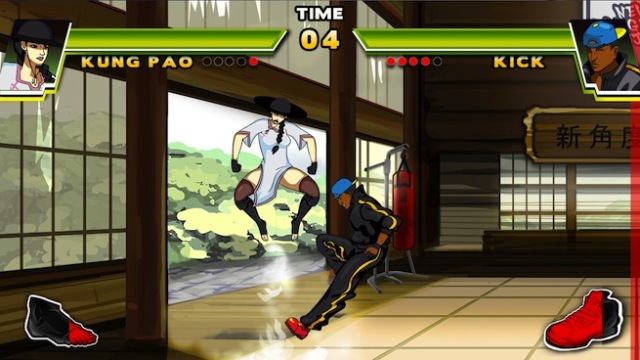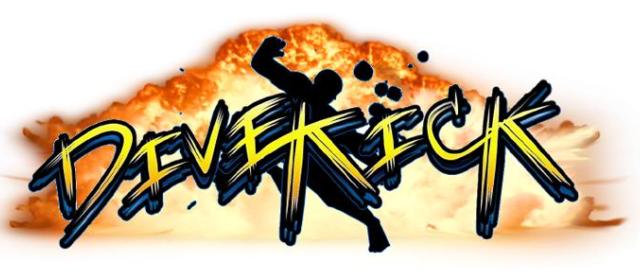Give us the skinny: Divekick is a fighting game that began life as a Kickstarter campaign before Iron Galaxy struck a deal with its developers, One True Game Studios, to release it on PlayStation 3 and PS Vita. You can also find it on Steam Greenlight if you want to back a potential PC release.
Just the facts, please: Divekick started out as a bit of a joke, but eventually turned into a genuine project for creator Adam “Keits” Heart. The premise couldn’t be more simple: two fighters face off against one another and attempt to land the titular Divekick. Whoever succeeds wins the round (your character has 1800 health, and each kick does 20,000 points of damage), and the first one to win five rounds wins the match. To better facilitate the unique mechanics, there are only two buttons – one to dive and one to kick. Your skill comes into play when you’re forced to judge the distance to your opponent in order to land that winning kick, and in manoeuvring backwards to avoid the blow. Although you can evade, you can’t block or counter, and mistiming a kick will leave you open to reparation.

It’s a simple mechanic with the scope to become very tactical, especially with the Kick Factor Gauge, a shoe-shaped meter that fills with each kick until it activates a turbo mode to increase movement speed. Once activated, the Kick Factor persists across rounds until the character is hit. Kick Factor can be harvested to activate your turbo mode sooner, or used up to perform special moves – of which each character has two, one aerial and one ground-based; these are triggered by pressing both buttons at the same time.
There are currently 8 characters in the line-up, including Dive and Kick, two hoodie-wearing combatants, and six others who are mostly tongue-in-cheek parodies of characters from other games, such as Kung-Pao, a female fighter with a wide-brimmed hat reminiscent of Mortal Kombat’s Kung Lao, and Mr N who shares similarities with Street Fighter’s Rufus.
Depth is added to Divekick by way of various parody mechanics that simultaneously pay homage to and poke fun at other fighting games. “Fraud Detection” is similar to Skullgirls’ Infinite Protection system, while “Choke Detection” occurs when you win four bouts in a row and lose the fifth. A version of Street Fighter X Tekken’s gems have even found their way into the game, whereby equipping certain gems pre-match will increase the speed and potency of your diving and kicking. Despite these added tactical touches, the set-up is so straightforward that One True Game Studios has even designed a unique pad for use with their game.

Although not officially in production yet, the “KickBox” is a specially-designed controller custom built for Divekick. It looks cool, but the fact that it’s unlikely to ever be used for any other game is making potential investors hesitant. Still, collectors and fighting afficianados will lap them up.
Should we be excited? It’d hard to say without first playing the game, but there’s a definite uniqueness to Divekick and a simple charm that makes it stand out from the crowd of fighting games on the current market. The concept is great, and you simply can’t fault the passion that’s gone into making Divekick a reality, from its Kickstarter conception to its acquisition by Iron Galaxy.
We spoke briefly to Dave Lang, Iron Galaxy’s CEO, about what got him excited about Divekick, and what made him decide to publish it.
“I’ve always loved fighting games,” he told us. “I played a ton of them growing up, especially in High School and College. After that, though, it got harder to play them competitively. I didn’t have any roommates to practice with, and not a lot in the way of “free time” as I started my first job. So when I first played Adam’s original Divekick prototype at UFGT last year, I instantly fell in love with it.”
And the purity of the premise appealed to Lang right away. “It’s pretty unique in that you can understand all the mechanics in a matter of minutes,” he explains, “but this simplicity doesn’t cost the game any depth. All the fundamental skills that separate good players from bad ones are still present in Divekick (spacing, reading your opponent, fast reactions, and mind games) but you don’t have to spend 30 hours in training mode to master how to pull combos off.”
As for attracting new gamers to the genre, Divekick has the potential to be the perfect jumping off point. Despite its two-button set-up, complexity exists beneath the deceptively simple veneer in terms of setting up your attacks, mastering the timing and pre-empting your opponent. It’s almost like training for the more complex titles, and Lang himself says that he hopes that “[Divekick] will serve as a gateway drug for people to get into fighting games.”
[nggallery id=1490]
For updates and more information, follow Divekick on Facebook and Twitter.






